
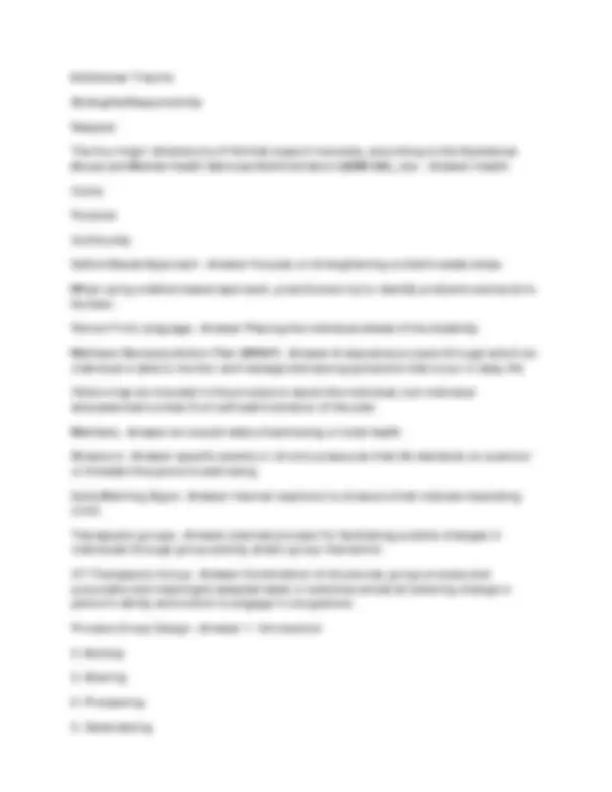
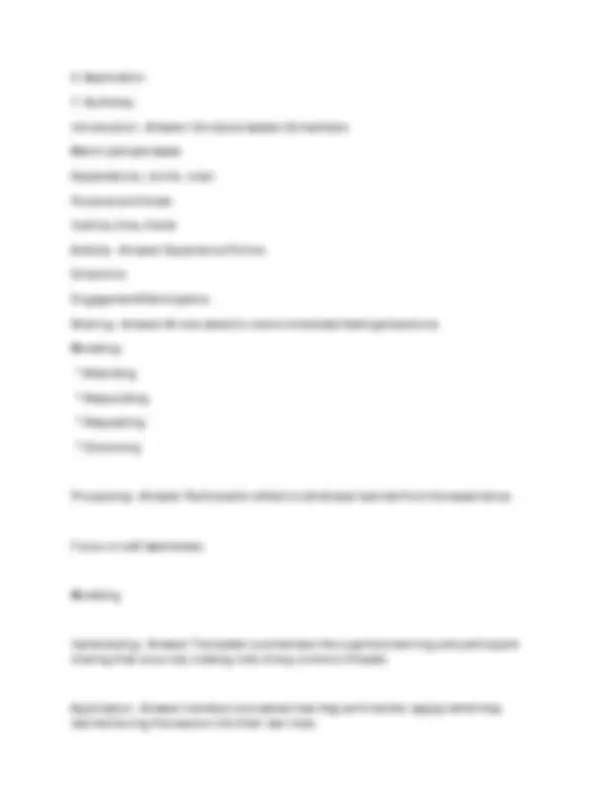
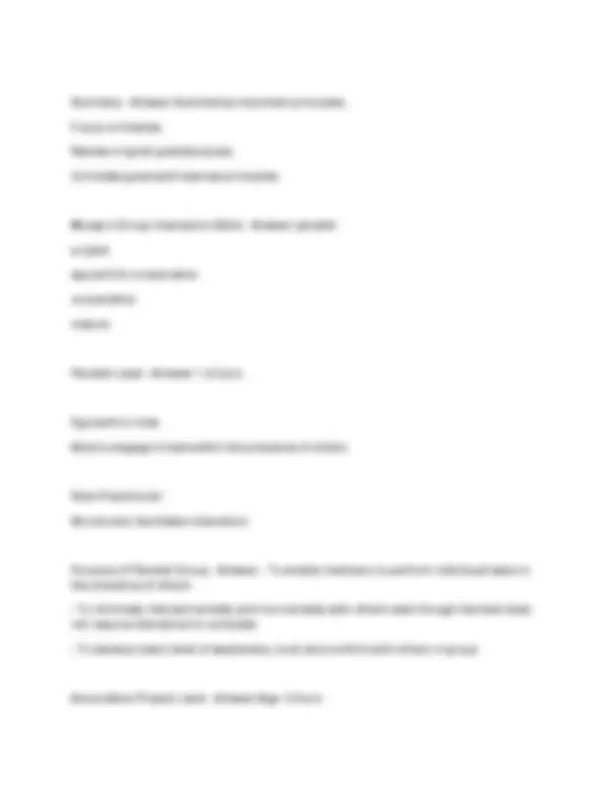
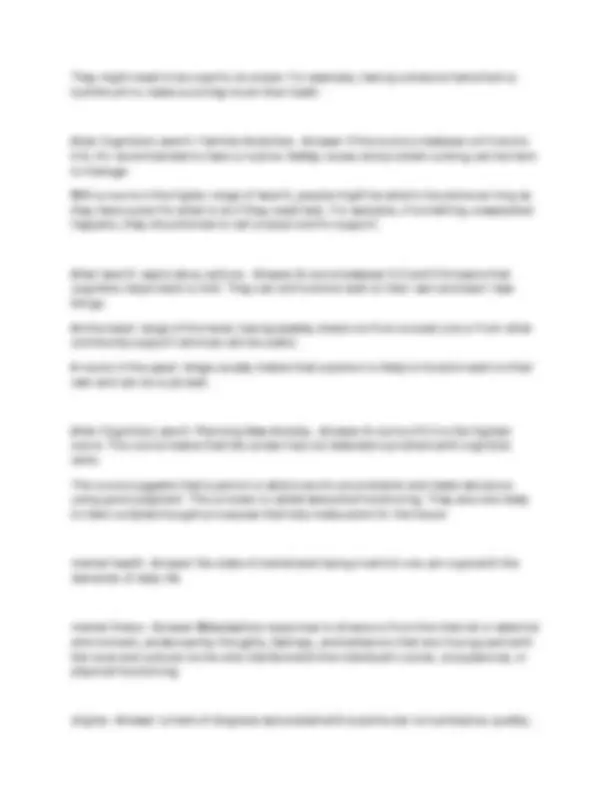
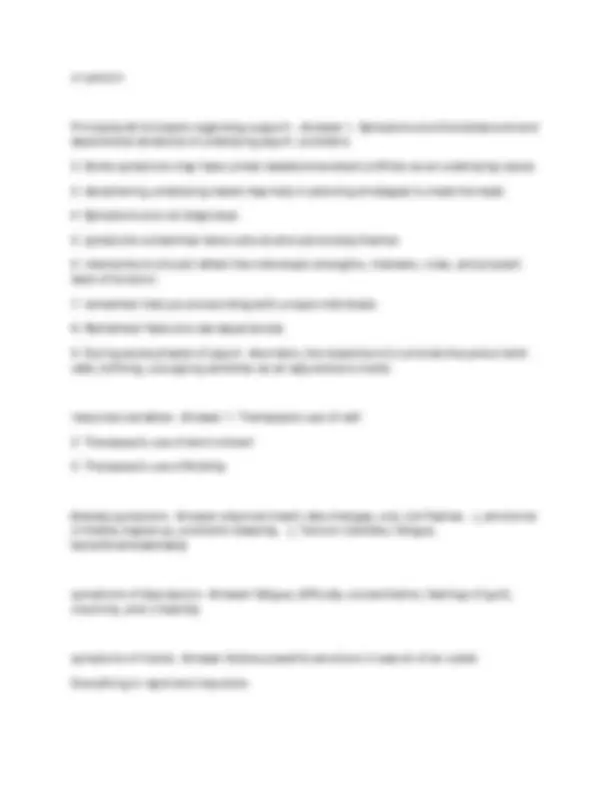
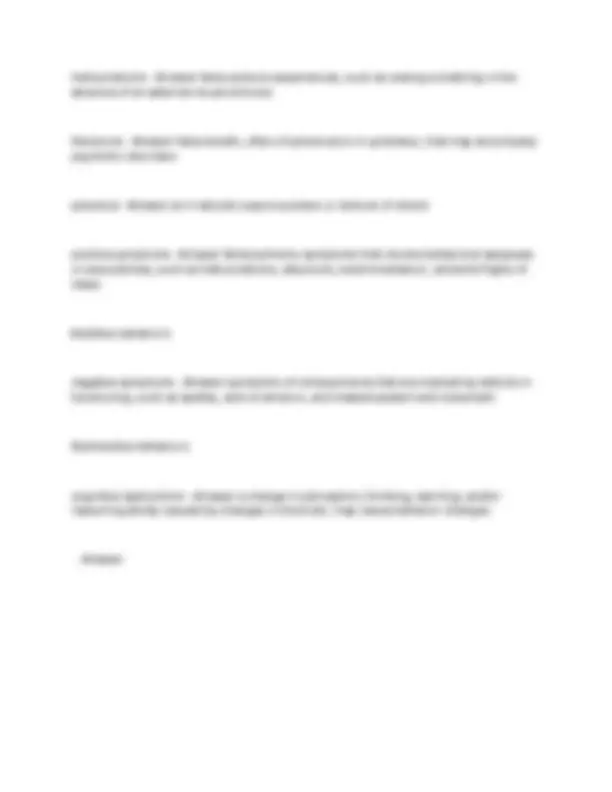


Study with the several resources on Docsity

Earn points by helping other students or get them with a premium plan


Prepare for your exams
Study with the several resources on Docsity

Earn points to download
Earn points by helping other students or get them with a premium plan
Community
Ask the community for help and clear up your study doubts
Discover the best universities in your country according to Docsity users
Free resources
Download our free guides on studying techniques, anxiety management strategies, and thesis advice from Docsity tutors
OT200 Psychosocial Practice Exam Study Guide
Typology: Exams
1 / 10

This page cannot be seen from the preview
Don't miss anything!







care - Answer to see to an individuals needs recovery - Answer a process of change through which individuals improve their health and wellness, live a self-directed life, and strive to reach their full potential. treatment - Answer medical services or care given to a client for a disorder or injury Rehabilitation - Answer the action of restoring an individual to health or normal life through therapy Mental Health History: 1600s-1940s - Answer The care model.
Major Tranquilizer Drug Deinstitutionalization - Answer moving people with psychological or developmental disabilities from highly structured institutions to home- or community-based settings 1960s-1970s group therapy - Answer Therapist is a facilitator. Utilize insight and support of group members to help one another. Psychodrama - Answer group therapy in which a patient expresses feelings by acting out family and social roles with other patients group activity - Answer Social, leisure, and vocational skills development. Emphasis on preparing patients for release into the community milieu therapy - Answer Therapeutic community in which the entire social environment surrounding each patient became a therapeutic tool. Mid 1970s -1990s : Reform of Community Mental Health - Answer Community Support Program of 1977 Community Support Services
Processing - Answer Participants reflect on what was learned from the experience.
Focus on self-awareness.
Modeling
Generalizing - Answer The leader summarizes the cognitive learning and participant sharing that occurred, making note of any common threads.
Application - Answer members are asked how they will transfer (apply) what they learned during the session into their own lives
Summary - Answer Summarize important principles. Focus on themes. Review original goals/purpose. Correlate goals with learned principles.
Mosey's Group Interaction Skills - Answer parallel project egocentric-cooperative cooperative mature
Parallel Level - Answer 1.5-2 yrs
Egocentric roles Able to engage in task within the presence of others.
Role Practitioner: Structured, facilitates interaction
Purpose of Parallel Group - Answer - To enable members to perform individual tasks in the presence of others
Associative Project Level - Answer Age: 2-4 yrs
Mature level group - Answer 15-18 years; exploring, responsibility, variety of interests, mixed backgrounds *at a mature level group, COTAs are just supervising and monitoring
Purpose of mature group - Answer - Enable members to assume all functional socio-emotional and task roles w/in group
Allen Cognitive Level Test - Answer -A cognitive/perceptual evaluation -Utilized for populations with psychiatric disorders, acquired brain injury, and or dementia -Used as a screening tool to estimate an individual's cognitive level -The person performs three leather lacing stitches progressing in complexity -Allen has developed a six level scale of cognitive function (Level 1 = automatic actions to Level 6 = planned action)
Allen Level 1: Automatic - Answer A score ranging from 1.0 to 1.8 means that cognition and awareness are very impaired. At this level, people will need total care, 24 hours a day.
Allen Cognitive Level 2: Gross Body Movement - Answer A score between 2.0 and 2. means that a person can move around a little on their own, but still needs 24-hour care. They would need help with all activities of daily living, such as bathing, eating, and hygiene.
Allen Cognitive Level 3: Manual Action - Answer Scores between 3.0 and 3.8 mean a person needs someone to look after them and help with daily activities.
They might need to be cued to do a task. For example, having someone hand them a toothbrush to make sure they brush their teeth.
Allen Cognitive Level 4: Familiar Activities - Answer If the score is between a 4.0 and a 4.8, it's recommended to have a routine. Safety issues and problem-solving can be hard to manage. With a score in the higher range of level 4, people might be able to live alone as long as they have a plan for what to do if they need help. For example, if something unexpected happens, they should know to call a loved one for support.
Allen level 5: exploratory actions - Answer A score between 5.0 and 5.8 means that cognitive impairment is mild. They can still function well on their own and learn new things. At the lower range of this level, having weekly check-ins from a loved one or from other community support services can be useful. A score in the upper range usually means that a person is likely to function well on their own and can do a job well.
Allen Cognitive Leve 6: Planning New Activity - Answer A score of 6.0 is the highest score. This score means that the screen has not detected a problem with cognitive skills. This score suggests that a person is able to work out problems and make decisions using good judgment. This process is called executive functioning. They also are likely to have complex thought processes that help make plans for the future.
mental health - Answer the state of mental well-being in which one can cope with the demands of daily life
mental illness - Answer Maladaptive responses to stressors from the internal or external environment, evidenced by thoughts, feelings, and behaviors that are incongruent with the local and cultural norms and interfere with the individual's social, occupational, or physical functioning
stigma - Answer a mark of disgrace associated with a particular circumstance, quality,
Hallucinations - Answer false sensory experiences, such as seeing something in the absence of an external visual stimulus
Delusions - Answer false beliefs, often of persecution or grandeur, that may accompany psychotic disorders
paranoia - Answer an irrational suspiciousness or distrust of others
positive symptoms - Answer Schizophrenic symptoms that involve behavioral excesses or peculiarities, such as hallucinations, delusions, bizarre behavior, and wild flights of ideas.
Additive behaviors
negative symptoms - Answer symptoms of schizophrenia that are marked by deficits in functioning, such as apathy, lack of emotion, and slowed speech and movement
Subtractive behaviors
cognitive dysfunction - Answer a change in perception, thinking, learning, and/or reasoning ability caused by changes in the brain; may cause behavior changes